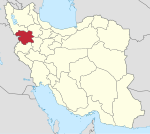Gerd Miran-e Olya
Gerd Miran-e Olya (Persian: گردميران عليا) is a village in, and the capital of, Yeylaq-e Jonubi Rural District of Bolbanabad District, Dehgolan County, Kurdistan province, Iran. The previous capital of the rural district was the village of Bolbanabad, now a city.
Demographics
Ethnicity
The village is populated by Kurds.
Population
At the time of the 2006 National Census, the village's population was 1,727 in 383 households, when it was in the former Yeylaq District of Qorveh County. The following census in 2011 counted 1,663 people in 474 households, by which time the district had been separated from the county in the establishment of Dehgolan County. The rural district was transferred to the new Bolbanabad District. The 2016 census measured the population of the village as 1,707 people in 534 households. It was the most populous village in its rural district.
See also
Notes
References
- ^ OpenStreetMap contributors (27 December 2024). "Gerd Miran-e Olya, Dehgolan County" (Map). OpenStreetMap (in Persian). Retrieved 27 December 2024.
- ^ Census of the Islamic Republic of Iran, 1395 (2016): Kurdistan Province. amar.org.ir (Report) (in Persian). The Statistical Center of Iran. Archived from the original (Excel) on 8 May 2022. Retrieved 19 December 2022.
- ^ Gerd Miran-e Olya can be found at GEOnet Names Server, at this link, by opening the Advanced Search box, entering "-3064109" in the "Unique Feature Id" form, and clicking on "Search Database".
- ^ Jahangiri, Ishaq (22 March 2017) [Approved 12 July 1397]. Approval letter regarding national divisions in the counties of Kurdistan province. rc.majlis.ir (Report) (in Persian). Ministry of the Interior, Council of Ministers. Notification 164176/T53013H. Archived from the original on 13 March 2019. Retrieved 3 March 2024 – via Islamic Parliament Research Center of the Islamic Republic of Iran.
- ^ Mousavi, Mirhossein (27 July 2014) [Approved 18 May 1366]. Creation and formation of 11 rural districts including villages, farms and places in Qorveh County under Kurdistan province. rc.majlis.ir (Report) (in Persian). Ministry of the Interior, Council of Ministers. Proposal 53.1.2213. Archived from the original on 18 July 2014. Retrieved 23 January 2024 – via Islamic Parliament Research Center.
- ^ Davodi, Parviz (c. 2024) [Approved 1 August 1388]. Approval regarding the transformation of the village of Bolbanabad, the center of Bolbanabad District, a part of Dehgolan County in Kurdistan province, into a city. lamtakam.com (Report) (in Persian). Ministry of the Interior, Political and Defense Ministry. Proposal 126362/42/4/1; Resolution 158802/T38854H; Notification 2413/T41578K. Archived from the original on 27 December 2024. Retrieved 27 December 2024 – via Lam ta Kam.
- ^ Mohammadirad, Masoud; Anonby, Erik; et al. "Language distribution in Kordestan Province, Iran". Atlas of the languages of Iran (ALI). Geomatics and Cartographic Research Centre, Carleton University. Archived from the original on 28 May 2023.
- ^ Census of the Islamic Republic of Iran, 1385 (2006): Kurdistan Province. amar.org.ir (Report) (in Persian). The Statistical Center of Iran. Archived from the original (Excel) on 20 September 2011. Retrieved 25 September 2022.
- ^ Census of the Islamic Republic of Iran, 1390 (2011): Kurdistan Province. irandataportal.syr.edu (Report) (in Persian). The Statistical Center of Iran. Archived from the original (Excel) on 19 January 2023. Retrieved 19 December 2022 – via Iran Data Portal, Syracuse University.
- ^ Davodi, Parviz (8 August 1390) [Approved 2 October 1386]. Letter of approval regarding the reforms of national divisions in Kurdistan province. rc.majlis.ir (Report) (in Persian). Ministry of the Interior, Political-Defense Commission of the Government Board. Proposal 93023/42/4/1; Letter 58538/T26118H; Notification 160027/T38028K. Archived from the original on 29 October 2011. Retrieved 14 November 2023 – via Islamic Parliament Research Center.
